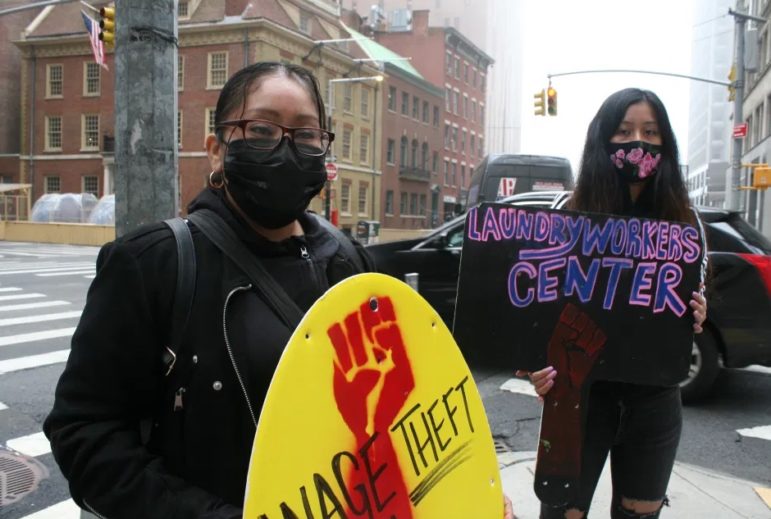
Fernando Martínez for El Diario/Impremedia
Laundry workers Sandra Mejías and Cecilia Dávila.This story was reported and originally published by El Diario on April 12, 2021. It was translated by Carlos Rodriguez and has been condensed and lightly edited for clarity.
The “tough stain” of worker exploitation that tarnishes the vital laundromat industry in the Big Apple has been frequently and roundly condemned. However, it seems to have only worsened due to the coronavirus pandemic.
The Laundry Workers Center (LWC) has been evaluating the possibility that these abusive practices may be at an all-time high after the city spent last year weathering the COVID-19 crisis. For decades, the center has reported how thousands of immigrants— mostly Latina, Asian and Black women—are victims of wage theft, harassment and unsafe working conditions.
“Since the start of the pandemic, many hours were cut, and hundreds of women who already were burdened with wages below the $15 minimum wage got the virus and were not paid sick days. In addition, they only had access to protective equipment in very rare cases, when part of their work involves handling items contaminated with fluids,” said Mahoma López, an organizer with LWT.
As revealed by the non-profit, the trend indicates that, even after workers unionize and turn to organizations to claim their rights, laundromat owners find ways around their responsibilities.
“What we have observed over time is that they claim bankruptcy, sub-contract, and reappear under a different name, or create a new company in order to avoid compensating workers. They take advantage of the fact that, legally, these claim processes at the corresponding institutions are extremely slow,” said López.
From the beginning of the public health crisis, laundry workers were considered “essential.” But a year later, and with the immunization campaign progressing across the city, these workers remained absent from early vaccination priority lists. To make matters worse, their working conditions appear to be deteriorating.
Mexican-born Cecilia Dávila and Sandra Mejías are part of the hundreds of workers affected. They have endured what they described as a string of abuses that included being subjected to wages under $11 per hour, exhausting work hours, and harassment by the owner of their workplace, located on Manhattan’s Upper West Side.
Things became more complicated for them when they and six other workers came together to file a complaint at the National Labor Relations Bureau (NLRB) in November. The office notified the management of Wash Supply, the laundromat where they worked, that they needed to comply with a series of worker benefits required by the law.
The complaint states that the company went out of business on Feb. 19 and failed to disburse outstanding payments. In the months after the claim, the workers say that they were submitted to “harassment and humiliation.”
“They never gave us any type of protection during the pandemic. They did not comply with any of the social distancing measures required for workplaces, either. We had already been forced to accept wages lower than the law requires, but then we started to fall ill and they refused to recognize our sick days benefit,” said Dávila, adding that folding 80 pounds of clothing per day was part of her daily tasks.
The immigrant workers, who filed the lawsuit through the LWC in a Manhattan court, said the “bosses” began to use a variety of tactics to pressure them.
“They would stand behind us and tell us to work faster, accusing us of being too slow. They would film us with a phone and later say that we were not doing our job. They changed our hours. They began to impose other conditions. They made our lives impossible,” said Dávila.
According to the workers, when they started the complaint process, the management tried to persuade them to withdraw the lawsuit by telling them that “things would get worse” for them, and that they “would not achieve anything and would end up unemployed anyway” because they “could always close the business.”
Mejías said that folding clothes was carried out in a basement with no ventilation, where the summer was “truly infernal,” made worse by the heat of the dryers. The workers spent long workdays in that confined space during the worst of the pandemic in order to make a living.
“Obviously, you need to earn an honest living, and you want to do the right thing. That is why you tolerate a lot of things, because you need the money. My husband had lost his job. But it came to a point when we were enduring inhumane conditions. Just imagine, when we felt sick, what they would do is give us a pill so we would keep working,” she said.
Mejías added that the management did not even provide masks to the workers, stating that they were only for drivers who delivered orders to customers.
“When they closed, they did not even tell us. They did not let us take our personal items, either. The mistreatment was extreme. We even had to bring our own toilet paper because they said that we stole it,” said the worker.
Rosanna Rodríguez-Aran, co-director of LWT, said that Dávila and Mejías’ stories illustrate a type of workers’ abuse that has become more extended and cruel across every borough in the city during the coronavirus public health crisis.
“That is why we started a series of demonstrations in front of laundromats where owners have committed violations, not just of the law but also of basic safety conditions,” said the activist.
El Diario emailed Wash Supply seeking comment on these claims. They had not replied by press time.
Asked about the abuse that many workers in this sector endure in the city, the owner of a coin laundry in lower Manhattan said that it is often the employees who fail to fulfill their part of the verbal agreements that employers enter with their reduced staff.
“We cannot call an entire industry as diverse as this one exploitative. We have made a gigantic effort to stay afloat during this crisis. Most of these companies are family businesses, managed by the owners themselves. Many of us are broke. Everything has come down. We can barely make rent,” said the merchant, who chose to remain anonymous.
LWT Co-director Mahoma López said that the organization is betting on new state legislation to bring a “true” new path towards halting worker exploitation in the industry. Such bills have been on hold for years.
“True justice for these immigrant workers will only be possible if the law changes. That is why we are supporting the Securing Wages Earned Against Theft (SWEAT) bill, which among other things will guarantee that the assets belonging to business owners accused of not paying employees are immediately frozen,” said the LWT leader.
The SWEAT Bill, coded S2844B, was introduced in the State Legislature by Colombian-American State Senator Jessica Ramos, and was approved by the Assembly and Senate in 2019. However, Gov. Andrew Cuomo vetoed it.
The governor said that he supports the intention behind the bill, but deemed the definition of “employer” as too broad. His signing has been delayed because of his concerns about “due process.”
The “loopholes” Cuomo sees in the proposed law have been revised by legislators, but sources at the State Assembly told El Diario that the bill does not seem to be among the priorities for the 2021 legislative session.
“Today, as we fight for workers’ justice for the women working in laundromats, who have been doubly exploited during the pandemic, we believe that signing the SWEAT bill would bring structural relief. All current mechanisms favor corporations because the process is so slow,” said López.
State Assemblywoman Catalina Cruz, who has proposed a bill to punish employers found guilty of paying wages below the legal minimum, said that the two laws designed to prevent these common offenses against New York’s working class are being evaluated by the Legislature’s committees.
“If you are walking down the street and a criminal steals $1,000 from you, they will go to jail if the police catch them. If your employer abuses their employees and steals thousands and thousands of dollars, it takes a long time and a lot of fighting for anything to happen. We need to change this system,” said the Colombian-born legislator.










2 thoughts on “Worker Exploitation in NYC’s Laundromat Industry Worsened by Pandemic, Advocates Say”
I would like to refute Mrs Ramos speaking that if a person steals $1000 goes to prison, first that’s a lie because in 2020 and 2021 there have been a lot of thefts, and yet it has not been seen that the jails are full of all these thieves. Second. I think that to speak that the owners of the laundromats scam and abuse their employees is a strong accusation because Laundromats business is not big corporations, but if they pay all the taxes, plus the cost of water, electricity, rent, plus the salary paid to employees (the same ones who receive their salary in cash, and none of them want to be paid in check or pay taxes, either because they get help from the government, or for other reasons they claim. Mrs Ramos you think the owners of these business are getting rich? let me tell you that you are very wrong and I invite you to visit the Laundromats business and talk to the owners of the laundromats and find out about the real situation that these business lived during the pandemic is also Mrs Ramos has not taken into account that most of these business did not receive any government help, because the PPL gave it only for business to employees who are residents or citizens of the USA and who were on the employee payroll and who filled the W2 form. They were unable to access any SBA loan because many of these businesses are owned by citizens who have no legal documents in this country, before supporting this type of complaint Mrs Ramos, I invite you to look at the two sides of the story.
Look at Jenny(IF THAT IS YOUR REAL NAME LIAR), who comes from a clan of thieving laundromat owners, crying, and being a hit dog.
None of your illogical ramblings made sense. Stop being a criminal, and follow the employment laws. Maybe you need to be put in overcrowded, COVID rampant Rikers, with those convicted of stealing cash. Maybe that punishment will put an end to your illegal practices, and criminal ways.
NO LAUNDROMAT OWNER IS ABOVE THE LAW. YOU WILL FACE JUSTICE!!!